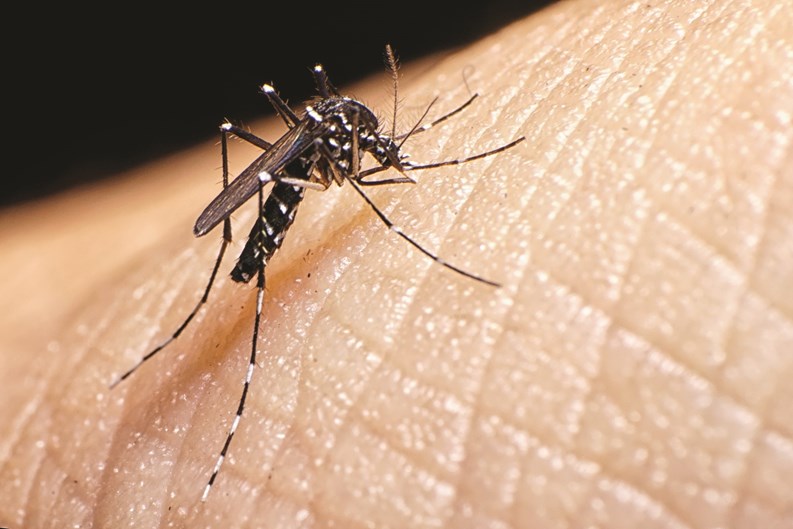Hardly a day goes by without hearing the latest news about the Zika virus. According to the Centers for Disease Control and Prevention (CDC), Zika can be transmitted through bites from an infected Aedes species of mosquito (Ae. aegypti and Ae. albopictus), from a mother to her fetus; through sexual contact between an infected man and his partners; and through blood transfusion. The symptoms associated with the virus include fever, red eyes, rash or joint pain. While most otherwise healthy adults will make a full recovery from infection, small children, the elderly, and those with compromised immune systems are at risk for serious complications. Most heartbreakingly, Zika can cause serious birth defects for pregnant women. At the moment, there is no specific medicine to treat the disease, says the CDC.
Jim Swayne, the founder of Safer Home Services in Clearwater, says that in his line of work he’s experienced previous mosquito-borne threats such as West Nile virus, eastern equine encephalitis, dengue fever and malaria. “The threats that we’ve dealt with before were handled very adequately by our large mosquito control organizations,” he says. “Zika, however, has a real chance to become a pandemic or become a serious problem, because the mosquitoes that carry Zika are local mosquitoes. They don’t normally travel more than a quarter mile from their breeding site. They’re daytime fliers, so they’re more active when we’re out in the middle of the day. ”
Zika Comes North
When Zika first made news in the U.S., the virus had mostly affected parts of Central and South America, Mexico and the Caribbean—and for a time cast attention on last summer’s Olympic Games in Rio. But what was once a problem overseas has found its way into the U.S.. Last July, officials announced four cases of Zika infection likely caused by mosquitoes in Florida, The New York Times reported. According to the Florida Department of Health, as of October 31 there have been a total of 771 cases of travel-related and 183 cases of non-travel related Zika infections in Florida. (Overall in the U.S., there has been a total of 3,951 cases of Zika associated with travel, while 139 have been acquired locally as of October 19, says the CDC). The aftermath of the Florida announcement reportedly prompted concerns about how the virus would affect the state’s tourism and the real estate industry.
Florida’s pest control pros have taken notice of the Zika problem, and spoke with us about how they conduct inspections and treatments of mosquitoes problems, and how homeowners can protect themselves from future mosquito issues.
Like most people, these pest experts first heard about Zika on the news. “There are many diseases associated with mosquitoes,” says Doug Longfellow, the president of NaturZone Pest Control, based in Sarasota. “This one has just gotten more press because of the birth defects,” he says. Adds Coby McConnell, the owner and president of Coby’s Tentless Termite and Pest Control in Palm Harbor: “When we first started hearing about it, it was ‘Okay, what’s the big deal?’ And then it got worse and worse and worse. And yes, we’ve monitored this on a very regular basis. If you look at our website and our Facebook page, we have put up quite a few articles on Zika.”
Whether these pest control companies received an uptick in calls or queries about Zika since the announcement of the cases last July depends on who you ask. Jonathan Monnett of Southeast Florida Pest Control, with locations in Boca Raton and Delray Beach, says he has experienced an increase in interest. “We’ve increased mosquito control quite a bit from where we were before. Before it was very minimal. It’s picked up quite a bit, especially among younger families who are concerned with children, or having children. Once we had the first actually transmitted [case] into Florida, that’s when we first started really getting calls.” For others, it’s been the opposite reaction. “It has been actually minimal,” says McConnell. “Very few people seemed to be worried about Zika, even with the reported cases in Pinellas County. So we haven’t had much of an uptick at all.”
For its part, the Virginia-based National Pest Management Association (NPMA) has worked on a number of outreach programs regarding Zika, says Dr. Jim Fredericks, the association’s chief entomologist. “We’ve done things like technical updates [and] educational programming at our meetings,” he says. “We’ve done webinars for our members. So we’ve made a real effort to make sure that all of the NPMA members are well educated on Zika, as well as how to control the mosquitoes that are capable of transmitting the virus.”
Mosquitoes and Your Property
Nothing can truly eliminate mosquitoes on a given property, but to minimize their presence and hopefully lower the likelihood of Zika-carrying pests making your home their home, Fredericks advises homeowners and HOA staff members to do a self-evaluation of their properties, part of a message that the NPMA is trying to get out to the public. “Identify and eliminate any standing water that might happen to be on the property,” he says, adding that “That’s easier said than done. The mosquitoes that transmit Zika in particular are capable of breeding in containers that are as small as a bottle cap. So, when we talk about where could these things be breeding? They could be breeding in toys left in the backyard. They could be breeding in neglected pots or gardening stuff that’s around that yard. But even junk or trash that might accumulate in and around the property. Look very closely at any of these places where water could get trapped for more than a week, because that will be an area that these mosquitoes would be able to complete their life cycle. So the first is to identify and eliminate standing water.”
McConnell agrees, but is quick to add that “What people don’t realize is that you can have a breeding site and you can have a harborage site. The harborage site could be any piece of shade, a bush or shrub, a tree, anything, and it has nothing to do with standing water. So just because they breed in [areas of standing water] does not mean they’re also going to live in those areas.”
Even if residents and association staff have done their part by policing their community and making it as unappealing as possible to tiny bloodsuckers, it may still take the attention of a professional to really get an existing mosquito problem under control.
“Talk to a pest control company about what they can do to provide relief from biting mosquitoes in your yard,” says Fredericks.”There’s no way to guarantee that a mosquito from down the street won’t fly over to your backyard and bite you. But there are definite ways that pest management professionals can help to reduce the number of biting mosquitoes on your property through integrated pest management (IPM) methods, like reducing breeding locations.”
For example, Swayne says his staff will meet with a homeowner or group of homeowners to discuss the situation, such as where at the property is getting affected by the mosquitoes. Then, “They do a very thorough inspection, looking for a possible breeding sites: standing water, containers holding water, leaf litter. More lush landscaping oftentimes produces more natural breeding sites. So we do a very thorough assessment; we’re looking for low-lying areas, man-made containers, [and] structural components such as gutters and air conditioners, roof components, porches, driveways, sidewalks, swimming pools, swing sets.”
”We have to make sure there’s nothing hidden that people just don’t realize,” McConnell adds. “A lot of times they’ve done everything they can think of, and yet there’s that one thing or two things that are hidden, such as those harborage areas.”
Once breeding and harborage areas are found and minimized or eliminated, pest pros turn to the treatment phase of the mosquito control equation. Longfellow says that “In terms of treatment, we use [two] products: a pesticide with an insect growth regulator (IGR) is applied to bushes, because mosquitoes rest in shady areas on the underside of leaves. The pesticide kills adult mosquitoes and the IGR makes the females sterile.”
For his part, Monnett adds that “After we’re done with the whole property, if there are low lying gutters, we check those to make sure they’re clean. Then we do a fogging of the entire property with a residual insecticide. We do our treatments every30 days, but honestly I prefer to do it every 21 days. We’ll perform that same protocol each time we go.” Once the treatment is complete, Monnett leaves an easy-to-read handout with property owners and administrators illustrating potential trouble spots that could lead to re-infestation and tips for minimizing the likelihood of that. “It gives people more understanding of what they need to do,” he says. “I found that was a benefit.”
For Swayne, their program is every 60 days after they eliminate the existing population. “For most residential landscapes and homes, we do seven applications the first year, so we do the first month, second month, third month, and then after the third month we go every other month. And we can get about 90 percent reduction on all mosquito populations.” Both McConnell and Longfellow’s programs generally run from March through November.
The Forecast on Zika
The Florida Department of Health continues to post daily Zika updates on its website, giving info about the latest reported cases, and areas where the the virus is actively transmitted “In my opinion, it’s going to be an ongoing problem,” says Monnett, “especially where we are, because we get mosquitoes year-round. It does lighten up during the winter, but there’s still mosquitoes around, so you still have a problem. But it’s so bad in a lot of other countries that people travel to and come back, it’s likely to be a problem until they get a vaccine.”
McConnell agrees. “I think it’s a huge problem,” he says. “I think this is the tip of the iceberg that we’re experiencing. There’s a $1.1 billion proposal on how to fight Zika. We’ll see what happens. I believe it will be good for our business, but in this case our business is the public health, and we want to make sure we can help out in any way we can.”
Longfellow stresses the need to stay vigilant, even as the media furor over Zika wanes in favor of the next big story. “The concern [over West Nile virus] lasted as long as the press covered it, and then people seemed to forget,” he says. “My advice to property managers is to realize that in addition to Zika and West Nile, there are many diseases associated with mosquitoes. Protect your community before the next big thing comes along – it’s better to prevent an issue than react to one.”
Protect Yourself
These pest control experts concur that there are steps that homeowners can take to prevent having a mosquito control problem. “Wear sensible clothing that prevents mosquitoes,” advises Jim Swayne of the Clearwater-based Safer Home Services. “Wear personal insect repellant. Plan your activities in areas where it’s less likely you’ll encounter mosquitoes.
On its web page devoted to Zika, the CDC also offers the following tips to control mosquitoes at home:
Outdoors:
● Empty and scrub, cover or discard items that hold water (such as tires, buckets, pools, toys and flowerpots) about once a week.
● Kill mosquitoes where they reside using outdoor insect spray.
● Fix cracks or gaps in a septic tank, as well as cover open vent or plumbing pipes.
Indoors:
● Put in or fix window and door screens, and don’t leave doors widely opened.
● Turn on air conditioning.
● Empty and scrub, cover or discard items that carry water (such as vases and flowerpots) about once a week.
● Use indoor insect spray (Mosquitoes can reside in dark humid areas such as in closets and underneath the sink).
For the latest information on Zika, visit the Florida Department of Health’s website www.floridahealth.gov or call their hotline 855-622-6735; or the Centers for Disease Control and Prevention’s Zika page at www.cdc.gov/zika.
The National Pest Management Association has a Zika section on its website, which can be found at www.npmapestworld.org/technical-resources/npma-zika-resource-package.
David Chiu is an associate editor at The South Florida Cooperator.







Leave a Comment